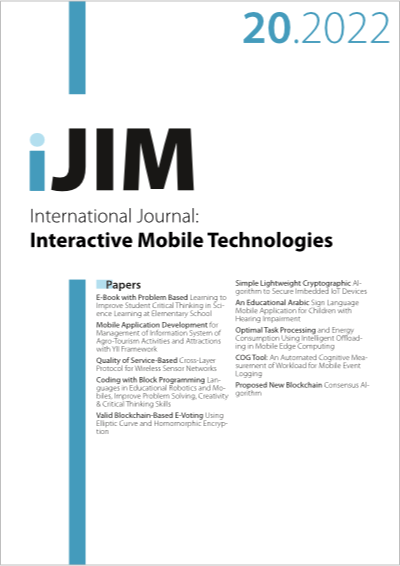Optimal Task Processing and Energy Consumption Using Intelligent Offloading in Mobile Edge Computing
DOI:
https://doi.org/10.3991/ijim.v16i20.34373Keywords:
Mobile Edge Computing, Computation offloading, Resource optimization, energy efficiencyAbstract
The appearance of Edge Computing with the possibility to bring powerful computation servers near the mobile device is a major stepping stone towards better user experience and resource consumption optimization. Due to the Internet of Things invasion that led to the constant demand for communication and computation resources, many issues were imposed in order to deliver a seamless service within an optimized cost of time and energy, since most of the applications nowadays require real response time and rely on a limited battery resource. Therefore, Mobile Edge Computing is the new reliable paradigm in terms of communication and computation consumption by the mobile devices. Mobile Edge Computing rely on computation offloading to surpass cloud-based technologies issues and break the limitations of mobile devices such as computing, storage and battery resources. However, computation offloading is not always the optimal choice to adopt, which makes the offloading decision a crucial part in which many parameters should be taken in consideration such as delegating the heavy tasks to the appropriate machine within the network by migrating the high-resource node to an edge server and lend these capabilities to the low-resources one. In this paper, we use an Edge Computing simulator to see how network delay can impact the delivery of a certain result, we also experiment computation offloading using a two-tier with Edge Orchestration architecture, which turns out to be efficient in terms of processing time.
Downloads
Published
How to Cite
Issue
Section
License
Copyright (c) 2022 Sara Maftah, Mohamed El Ghmary, Hamid El Bouabidi, Mohamed Amnai, Ali Ouacha

This work is licensed under a Creative Commons Attribution 4.0 International License.



